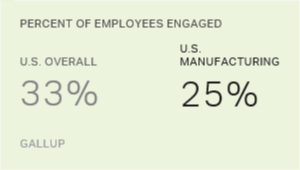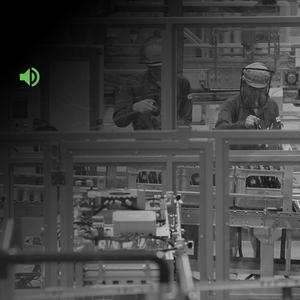Manufacturing
Explore Gallup's research.

Learn how manufacturing companies can create value propositions that attract and retain more women to fill the labor shortage.

73% of Americans say artificial intelligence will eliminate more jobs than it creates.

Despite its storied history and recent gains, the U.S. manufacturing sector is struggling to build engaging workplace cultures.

People living in places that shifted employment from manufacturing to other sectors do not evaluate their lives lower than those living in other areas.

Globalization has become a scapegoat for rising inequality and weak economic performance, but the evidence for this is weaker than commonly believed.

Learn how a manager in a fast-growing manufacturing firm has sought to bring CliftonStrengths-based solutions to his company to help it flourish.
Company-wide mission statements often don't resonate in manufacturing plants. But a local mission does.
Big Gallup findings include why great managers are so rare --- and why employee satisfaction doesn't matter, among others.
Gallup has uncovered seven unusual, innovative, and proven tactics to create productive and profitable working environments. You're not likely to find these ideas elsewhere.
Average levels of employee engagement aren't good enough for this company, as one New Jersey plant discovered. Here's how a fast-moving manager changed the plant's culture in less than a year.
Organizations going through change should involve their employees as much as possible in the process. Employee surveys are essential to hearing people's feedback, as one company has learned.
All conversations with employees are valuable, says Douglas Conant, a seasoned CEO, most recently of Campbell Soup Company. Every face-to-face interaction can promote a company's strategy and goals and increase a leader's impact.
As baby boomers age, managing older workers has become an issue, just as leading younger employees was in the 1990s. But when it comes to engagement with their jobs, it may not be the oldest nor the youngest who are most at risk.
Visionary CEO Ray Anderson, who proudly boasts the moniker "radical industrialist," says it's imperative that we save the environment -- but business, not government, must take the lead. In this interview, Anderson explains how other companies can do what his business has done.
At age 60, visionary CEO Ray Anderson, author of Confessions of a Radical Industrialist, decided to move his company toward environmental sustainability. He's proving that it's possible to do well -- very well -- by doing good. In this interview, he tells how.


